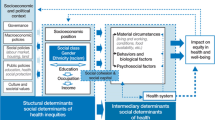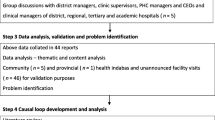Abstract
Evidence-based intervention (EBI) de–adoption and its influence on public health organizations are largely unexplored within public health implementation research. However, a recent shift in support for HIV prevention EBIs by the Centers for Disease Control and Prevention provides an opportunity to explore EBI de–adoption. The current mixed-method study examines EBI de-adoption and the subsequent impact on a community-based organization (CBO) dedicated to HIV prevention. We conducted a case study with a CBO implementing RESPECT, an HIV prevention EBI, over 5 years (2010–2014), but then deadopted the intervention. We collected archival data documenting RESPECT implementation and conducted two semistructured interviews with RESPECT staff (N = 5). Using Fixsen and colleagues’ implementation framework, we developed a narrative of RESPECT implementation, delivery, and deadoption and a thematic analysis to understand additional consequences of RESPECT de-adoption. Discontinuation of RESPECT activities unfolded in a process over time, requiring effort by RESPECT staff. RESPECT deadoption had widereaching influences on individual staff, interactions between the staff and the community, the agency overall, and for implementation of future EBIs. We propose a revision of the implementation framework, incorporating EBI deadoption as a phase of the implementation cycle. Furthermore, EBI deadoption may have important, unintended consequences and can inform future HIV prevention strategies and guide research focusing on EBI de-adoption.

Similar content being viewed by others
References
Ogden, T., & Fixsen, D. L. (2014). Implementation science: a brief overview and a look ahead. Zeitschrift für Psychologie., 222(1), 4–11.
Fixsen DL, Naoom SF, Blase KA, Friedman RM, Wallace F. Implementation research: a synthesis of the literature. Tampa, FL: of South Florida, Louis de la Parte Florida Mental Health Institute, The National Implementation Research Network, 2005; Contract No.: FMHI Publication #231.
Niven, D. J., Mrklas, K. J., Holodinsky, J. K., et al. (2015). Towards understanding the de-adoption of low-value clinical practices: a scoping review. BMC medicine., 13(1), 255.
Brownson, R. C., Allen, P., Jacob, R. R., et al. (2015). Understanding mis-implementation in public health practice. American Journal of Preventive Medicine., 48(5), 543–551.
Bertram, R. M., Blase, K. A., & Fixsen, D. L. (2015). Improving programs and outcomes implementation frameworks and organization change. Research on Social Work Practice., 25(4), 477–487.
Shediac-Rizkallah, M. C., & Bone, L. R. (1998). Planning for the sustainability of community-based health programs: conceptual frameworks and future directions for research, practice and policy. Health Education Research., 13(1), 87–108.
Hawe, P., Shiell, A., & Riley, T. (2009). Theorising interventions as events in systems. American Journal of Community Psychology, 43, 267–276.
Greenhalgh, T., Macfarlane, F., Barton-Sweeney, C., & Woodard, F. (2012). “If We Build It, Will It Stay?” A case study of the sustainability of whole-system change in London. The Milbank Quarterly., 90(3), 516–547.
Aral, S. O., & Blanchard, J. F. (2012). The program science initiative: Improving the planning, implementation and evaluation of HIV/STI prevention programs. Sexually Transmitted Infections., 88(3), 157–159.
Freedman, A. M., Kuester, S. A., & Jernigan, J. (2013). Evaluating public health resources: what happens when funding disappears? Preventing Chronic Disease., 10, E190–E196.
Prasad, V., & Ioannidis, J. P. (2014). Evidence-based de-implementation for contradicted, unproven, and aspiring healthcare practices. Implementation Science., 9(1), 1.
Aron, D. C., Lowery, J., Tseng, C. L., Conlin, P., & Kahwati, L. (2014). De-implementation of inappropriately tight control (of hypoglycemia) for health: protocol with an example of a research grant application. Implementation Science., 9(1), 58.
Collins, C. B., & Sapiano, T. N. (2016). Lessons learned from dissemination of evidence-based interventions for HIV prevention. American Journal of Preventive Medicine., 51, S140–S147.
Centers for Disease Control and Prevention. High impact HIV prevention. 2015 [cited 4/11/2016]; Available from: https://effectiveinterventions.cdc.gov/docs/default-source/general-docs/15-1106-hip-overview-factsheet.pdf?sfvrsn=2.
Yin RK. Case study research: Design and methods. SAGE Publishing; 2009.
Kamb, M. L., Fishbein, M., Douglas, J. M., et al. (1998). Efficacy of risk-reduction counseling to prevent human immunodeficiency virus and sexually transmitted diseases: a randomized controlled trial. Project RESPECT Study Group. Journal of the American Medical Association, 280(13), 1161–1167.
Metsch, L. R., Feaster, D. J., Gooden, L., et al. (2013). Effect of risk-reduction counseling with rapid HIV testing on risk of acquiring sexually transmitted infections: the AWARE randomized clinical trial. Journal of the American Medical Association, 310(16), 1701–1710.
Craw, J. A., Gardner, L. I., Marks, G., et al. (2008). Brief strengths-based case management promotes entry into HIV medical care: results of the antiretroviral treatment access study-II. Journal of Aquired Immune Deficiency Syndromes, 47(5), 597–606.
Centers for Disease Prevention and Control. Frequently asked questions: CTR and RESPECT. [cited 02/01/17]; Available from: https://effectiveinterventions.cdc.gov/Files/RESPECT_FAQ.pdf
Dolcini, M. M., Catania, J. A., Gandelman, A., & Ozer, E. M. (2014). Implementing a brief evidence-based HIV intervention: a mixed methods examination of compliance fidelity. Translational Behavioral Medicine., 4(4), 424–433.
Acknowledgements
This research was supported in part by the Ruth E. Warnke Graduate Fellowship and the Provost’s Distinguished Fellowship awarded to Virginia McKay by the College of Public Health and Human Sciences at the Oregon State University. This research was also supported in part by the National Institute of Mental Health grant number T32 MH019960, awarded to Enola Proctor and the National Institute of Mental Health grant number R01 MH085502-01, awarded to M. Margaret Dolcini.
We would like to thank Chenoa Allen for reviewing qualitative codes and acting as a second coder. We would also like to thank Brian R. Flay and Joseph A. Catania for their feedback throughout the drafting of this manuscript.
Author information
Authors and Affiliations
Corresponding author
Ethics declarations
All procedures performed in studies involving human participants were in accordance with the ethical standards of the institutional and/or national research committee and with the 1975 Helsinki Declaration and its later amendments or comparable ethical standards. Informed consent was obtained from all individual participants included in the study.
Additional information
Implications
Practice: Public health organizations that are de-adopting evidence-based interventions should plan carefully for this final stage of implementation, paying close attention to the impact of changes in staff and communities.
Policy: Policies designed to disseminate evidence-based interventions would benefit from allowing time and providing guidelines on how to successfully discontinue and replace interventions.
Research: Further exploration of intervention de-adoption is needed to understand the process and impact of de-adoption. Dissemination and implementation frameworks in public health would benefit from incorporating de-adoption as a distinct phase of the implementation process.
About this article
Cite this article
McKay, V.R., Margaret Dolcini, M. & Hoffer, L.D. The dynamics of de-adoption: a case study of policy change, de-adoption, and replacement of an evidence-based HIV intervention. Behav. Med. Pract. Policy Res. 7, 821–831 (2017). https://doi.org/10.1007/s13142-017-0493-1
Published:
Issue Date:
DOI: https://doi.org/10.1007/s13142-017-0493-1




